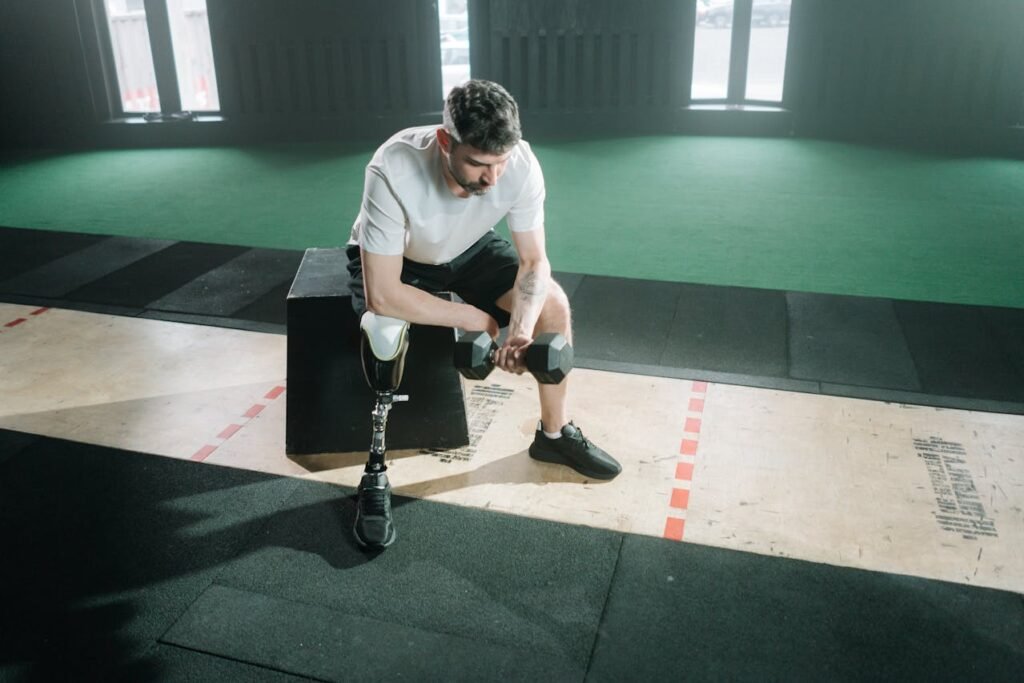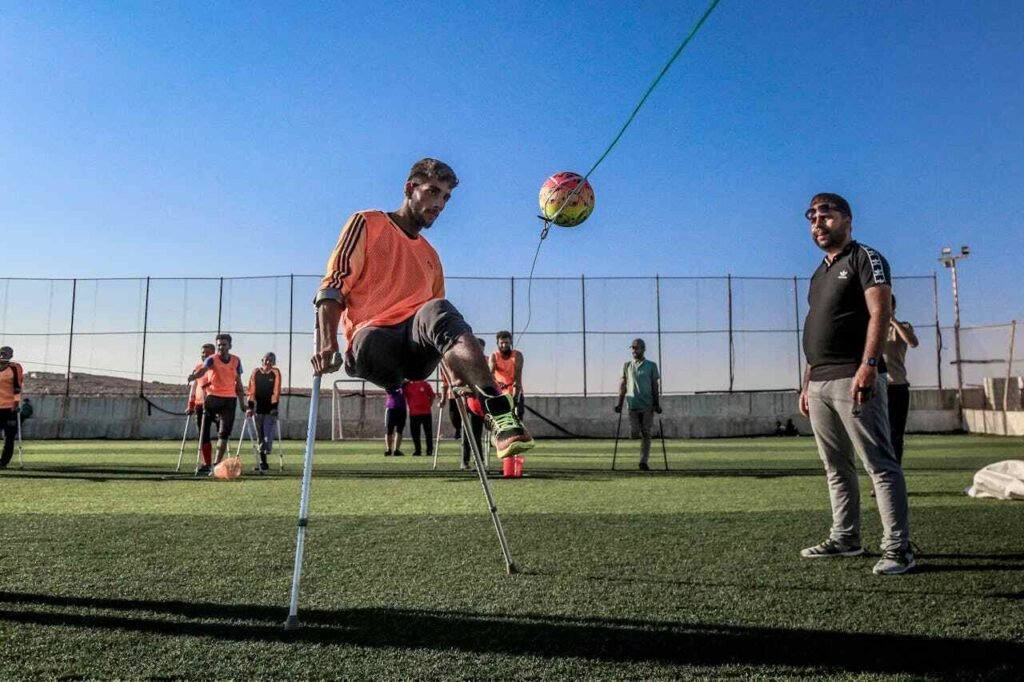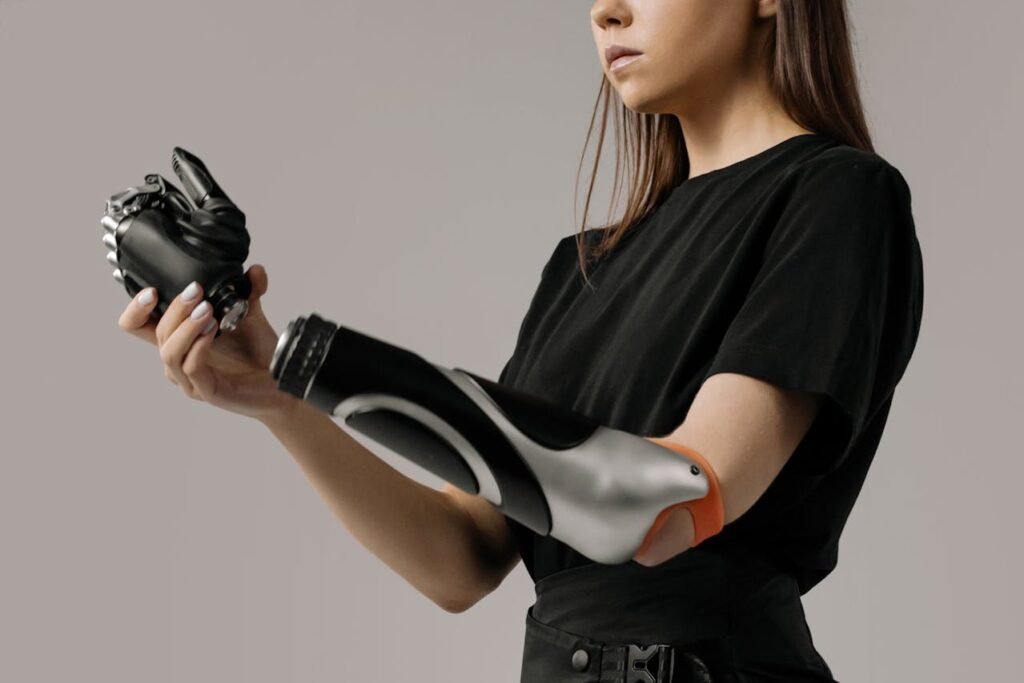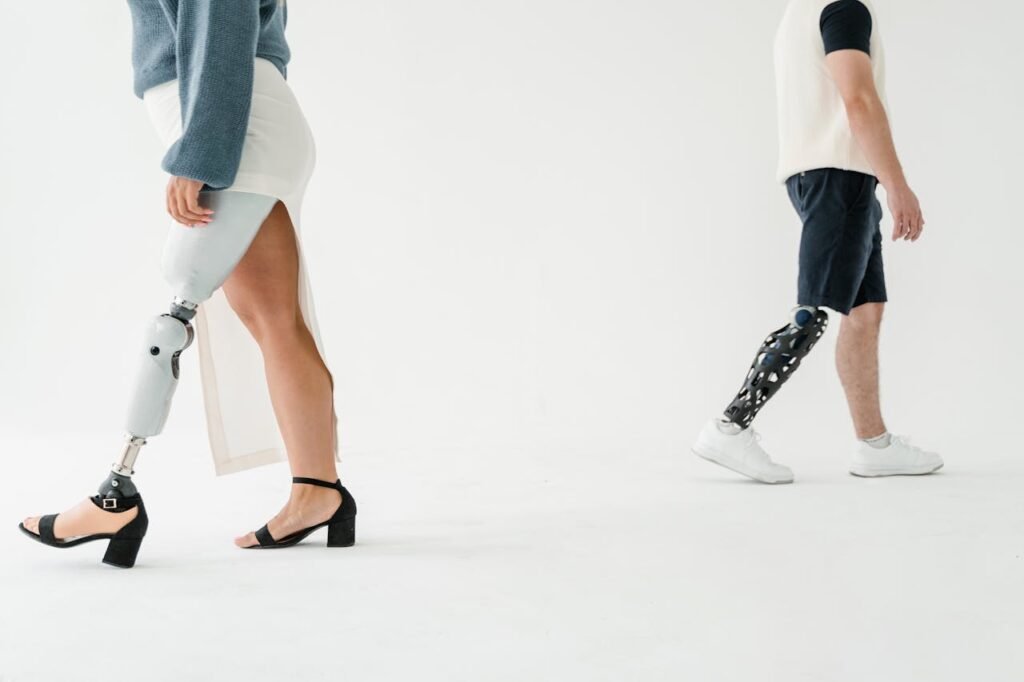Starting college is a big step for anyone. It’s a time filled with new friends, new classes, and a whole new kind of independence. For students using prosthetic limbs, especially those staying in hostels away from home, this new chapter can bring its own unique challenges — and even greater victories.
From getting ready in the morning to managing long lectures, sports, hostel chores, and late-night study sessions, life with a prosthetic in college is all about balance and routine. It’s not about doing everything differently — it’s about finding what works best for you.
At RoboBionics, we’ve worked with hundreds of young people who’ve started their college journeys wearing prosthetic hands or limbs. We’ve seen the small daily habits that make all the difference — the tricks that make mornings easier, the hacks that keep energy up through the day, and the ways to stay confident when life gets overwhelming.
This article is here to guide you through that. It’s not about theory or big medical terms — just real-life routines that work. Think of it as a friendly guide to help you move through college and hostel life smoothly, confidently, and comfortably — with a few smart tricks that can make every day a little simpler.
Morning Routines and Getting Ready for the Day
Waking Up with Confidence

Mornings in a hostel can be loud, busy, and full of movement. The alarm rings, roommates talk, and everyone rushes to get ready. For students using prosthetics, the day starts with a few extra steps — but with time, it becomes second nature.
Begin by setting your alarm 10–15 minutes earlier than others. This gives you quiet time to prepare without the pressure of a crowd. Use this space to check your prosthetic, stretch your muscles, and mentally plan your day.
If your prosthetic is myoelectric, like the Grippy Bionic Hand, ensure it’s charged overnight. Keep your charger and socket close to your bed so you never have to look for them in the morning rush.
Easy Morning Hygiene
Hostel bathrooms can be challenging because they’re often shared. Choose a time when it’s less crowded — early morning or after the rush. Keep your toiletries organized in a small, waterproof pouch that’s easy to carry.
If your prosthetic hand is water-resistant or detachable, plan your routine accordingly. Many users prefer removing it during showers to keep it clean and dry. Keep a towel nearby before you start, so you don’t have to move around too much afterward.
After bathing, check your stump area for any irritation. Hostel water can be harder or treated with chlorine, which may affect the skin. Apply a mild moisturizer or lotion to keep the skin healthy and avoid chafing before wearing your socket again.
Dressing Up with Ease
Clothing choices can make mornings easier. Opt for soft fabrics and simple fastenings. Avoid clothes with tight sleeves or buttons that require too much finger coordination. T-shirts, elastic pants, and slip-on shoes can be both stylish and practical.
Lay out your clothes the night before. This small habit reduces stress in the morning. Some students even keep a small mirror near their bed to help them get ready faster.
When wearing your prosthetic, make sure it fits comfortably and that all connections are secure. If you’re using Grippy, test its grip once or twice before heading out to ensure everything feels natural.
A Good Breakfast Routine
College life often means rushing out without breakfast — but that’s one habit worth breaking. Eating something simple but nourishing keeps your energy steady for long classes.
If your hostel provides a mess, choose foods that are easy to handle with your prosthetic. Parathas, idlis, or sandwiches are practical options. If you prefer eating in your room, keep dry fruits, protein bars, or bananas handy.
Use utensils that suit your grip. Some students find using spoons with thicker handles or lightweight cups more comfortable. With practice, you’ll learn small tricks that make meals quicker and smoother.
Getting to Class
Navigating Hostels and Campuses

College campuses can be large and sometimes not very accessible. Knowing your paths well can save time and energy. On your first few days, take time to walk around and note the shortest, safest routes between your hostel, classrooms, and canteen.
If your college has ramps or elevators, plan to use them when needed. Don’t hesitate to talk to the administration about accessibility support. Most institutions are more than willing to help once they understand your needs.
For stairs, practice your pace. Carrying light bags helps maintain balance. If you’re using a prosthetic arm or hand, keep heavier books in a backpack instead of one shoulder bag — it keeps both hands free for better movement.
Classroom Readiness
Arriving a few minutes early can help you settle in comfortably before class begins. Choose a seat where you can easily rest your prosthetic arm on the desk. A side or front seat often gives you more space to move without bumping into others.
Keep your stationery accessible. Use pens with thicker grips or light body weight for easier control. Some students prefer using digital tablets instead of notebooks — typing can sometimes be easier than long writing sessions.
If your class involves practical activities like labs, speak to your instructor in advance. They can suggest minor adjustments to make tasks smoother without drawing attention. Confidence grows when you prepare ahead.
Managing Long Lectures
Sitting for long hours can sometimes cause stiffness in the arm or stump area. Take short stretches between lectures. Moving your shoulders, neck, and arm gently helps blood flow and keeps you comfortable.
Keep a small cloth or handkerchief to wipe sweat under your prosthetic socket if it gets warm. Staying fresh helps you focus better through the day.
If your prosthetic uses power, like the Grippy Bionic Hand, it’s smart to carry a small portable charger in your bag. Most models last several hours, but being prepared prevents mid-day surprises.
Hostel Life and Evening Routines
Returning to the Hostel
After a long day, the hostel feels like a safe space again. It’s where you can relax, recharge, and prepare for the next day. Once back, take off your prosthetic and let your muscles rest. A few minutes of gentle massage on the residual limb can improve circulation and reduce tension.
Clean your prosthetic parts with a soft cloth. If you’ve been outdoors all day, dust and sweat can collect, affecting comfort. Keeping it clean daily avoids skin issues and keeps your device working smoothly.
Store it safely when not in use. Have a fixed spot — a soft towel or stand near your bed — to keep it away from moisture and accidental drops.
Evening Study Time
Hostel evenings often mean shared rooms, laughter, and a mix of noise and study time. Finding focus can be tough. Choose a quiet corner or go to the reading room if available.
Break your study sessions into small chunks. Use 25-minute focused sessions with short breaks. It keeps your energy balanced and avoids strain. If typing or writing feels tiring, switch between both. Flexibility keeps your hands and mind fresh.
For prosthetic users, wrist or shoulder stretches between study blocks help prevent fatigue. Many students also find using a study lamp with adjustable light easier on the eyes during late-night sessions.
Social Life and Friendships
Hostel life is full of friendships. It’s natural to worry about how others might react to your prosthetic, but most students are curious, not judgmental. Talking openly about it can break the ice.
When you’re comfortable, share your experience and answer questions. Most people admire your strength once they understand your journey. Friendships built on honesty last longer and bring confidence.
Join campus clubs, sports teams, or activities that interest you. Many students with prosthetics enjoy badminton, table tennis, and even dance clubs. Participation not only boosts confidence but also helps your body stay active.
Managing Hostel Chores
Hostel life also includes chores like washing clothes, arranging your bed, or organizing your room. Small adjustments make them easier.
Use light, easy-to-grip buckets for laundry. Choose washing powders that dissolve quickly so you don’t need to scrub too much. For hanging clothes, clip-style hangers save effort.
When making your bed, fold sheets and blankets in sections rather than all at once. Divide tasks into smaller steps — it’s faster and keeps things neat without tiring your arms.
Keeping your room organized is key. Use open baskets or labeled boxes to store things you use often. It reduces unnecessary movement and helps you find items easily even when you’re tired.
Night Routines and Self-Care
Winding Down the Day

Nights in college hostels are often full of chatter, group studies, or quiet reflection after a long day. For students using prosthetics, evening time is also the perfect moment to care for your limb, clean your device, and relax your mind.
Start by gently removing your prosthetic and inspecting your stump for any redness or soreness. A warm cloth can soothe tired muscles, and a light, fragrance-free moisturizer keeps your skin soft and healthy. Pay attention to any tight spots or pressure marks. Over time, you’ll learn which areas need extra care.
Keep your prosthetic near your bed in a clean, dry space. Some students like to wrap it in a soft cloth to protect it from dust. Make this a habit every night—it keeps the device lasting longer and gives you peace of mind before sleeping.
Staying Comfortable Before Sleep
Good sleep keeps both your body and mind refreshed. Make your bed cozy and simple to manage. Use lightweight blankets and soft pillows to avoid strain while moving at night.
If your room is noisy, try soft earplugs or calming music through headphones. Maintaining a steady bedtime helps regulate energy and makes mornings easier. Avoid spending long hours scrolling on your phone right before bed; instead, try short stretches or deep breathing exercises to relax your muscles.
Keep a small bedside lamp within easy reach so you don’t need to move around too much in the dark. Little things like this make hostel life smoother and safer.
Maintaining Hygiene and Prosthetic Care
Your prosthetic deserves as much attention as your body. Clean it gently every night using a soft, slightly damp cloth. If you’ve been out all day, dust or sweat can collect around the socket area. Cleaning daily prevents buildup and protects both your skin and the device.
Avoid harsh soaps or alcohol-based cleaners, as they may damage the materials. A simple wipe-down and occasional deep clean once a week keep it in great condition. If your prosthetic uses batteries, plug it in for charging before bed.
It’s smart to have a weekly check routine too. Look for loose fittings, small cracks, or signs of wear. If something feels different, reach out to your prosthetist or the support team immediately. Preventive care saves both time and discomfort.
Building Confidence and Emotional Strength
Handling Attention and Questions
It’s natural for others to be curious when they see a prosthetic. Some may ask questions, some may just look. The key is how you choose to respond. A smile and a simple answer often clear the air quickly.
Remember that your prosthetic doesn’t define you. It’s simply a tool that helps you live life more fully. Confidence comes from comfort—both physical and emotional. The more you use your device naturally, the more others see it as part of you.
If someone stares, stay calm. Most people mean no harm; they’re just unfamiliar. Over time, your attitude will inspire those around you to see prosthetics as something normal, even admirable.
Staying Positive During Difficult Days
College life can sometimes feel overwhelming, especially when classes pile up or when homesickness kicks in. Everyone faces hard days, and that’s completely normal.
On such days, take small steps. Start by doing one simple thing—tidying your desk, listening to music, or going for a short walk. Motion often brings clarity. Talking to a trusted friend or counselor can also help you feel lighter.
Many students find comfort in connecting with others who wear prosthetics. Sharing experiences builds strength and reminds you that you’re never alone in this journey. Every challenge teaches resilience, and every small victory adds to your confidence.
Joining Supportive Communities
Seek out student groups, disability inclusion clubs, or online forums where people share similar experiences. Being part of such communities can offer both emotional support and practical advice.
Some colleges have dedicated inclusion officers or student mentors who can help with adjustments in classrooms or hostels. Don’t hesitate to reach out—it’s their role to support you. Asking for help doesn’t mean you’re weak; it means you’re proactive about living better.
Engage with organizations that promote accessibility and inclusion. Participating in events or awareness drives helps you become an advocate for others and gives you a deeper sense of purpose.
Staying Active and Healthy
Physical Fitness for Prosthetic Users

Regular exercise keeps your muscles strong and supports smoother prosthetic control. Simple activities like walking, cycling, or stretching every morning or evening help maintain balance and endurance.
Join your college gym or find a nearby open area for workouts. If you’re using a myoelectric prosthetic, like Grippy, daily activity also helps fine-tune your muscle signals. Always start slow, and build up gradually.
Avoid comparing your pace with others. What matters most is consistency. Even short 15-minute sessions of stretching or yoga can improve posture and keep your joints flexible.
Balanced Diet and Hydration
Your diet directly affects your stamina, especially when balancing long days of study and activity. Eat regular meals and keep your plate colorful with fruits, vegetables, grains, and proteins.
Avoid skipping meals, especially breakfast. Carry easy snacks like nuts, fruit, or protein bars for mid-day energy. Staying hydrated is equally important; keep a water bottle handy in your backpack.
If you notice unusual tiredness or muscle cramps, review your diet. Sometimes, adding iron or calcium-rich foods makes a big difference. Hostels may not always serve perfect meals, but smart choices help you stay healthy.
Rest and Recovery
Your body does its best healing while you rest. After busy college days, your muscles need time to recover. Rest days aren’t lazy days—they’re part of balance.
On weekends, allow yourself extra sleep. Watch a movie, spend time with friends, or just relax. If you experience soreness around your prosthetic socket, give your limb a break for a few hours and gently stretch.
Listening to your body helps you prevent fatigue. Remember, energy is your real strength in college life—it fuels both your studies and your social life.
Managing Studies and Daily Responsibilities
Study Techniques That Work
Using a prosthetic shouldn’t limit your learning style—it just means you might need to find smarter methods. Recording lectures on your phone helps when note-taking feels tiring. Listening later helps you absorb details easily.
If typing suits you better, use a laptop or tablet. Many apps allow voice-to-text, turning spoken words into notes instantly. For written work, choose lightweight pens with good grip control.
Plan your study schedule realistically. Mix subjects so that you don’t strain your eyes or hands in one long stretch. Group study sessions can also help—you’ll learn faster and stay motivated.
Organizing Assignments and Exams
Deadlines are part of college life, but with a little structure, they don’t have to be stressful. Use planners or mobile apps to track submission dates and upcoming tests.
Break big tasks into smaller goals. For example, if you have a project due in two weeks, finish research in the first three days, draft by day five, and polish it by day ten.
If your prosthetic makes long writing sessions tiring, ask your professors about digital submissions or extra typing time during exams. Most educators appreciate honesty and cooperation.
Handling Hostel Responsibilities
Living in a hostel teaches independence. From laundry to managing expenses, it’s a complete learning experience. Keep a small weekly checklist—cleaning, budgeting, laundry—to stay organized.
Manage your time wisely. Study first, relax later. Avoid leaving chores for the last minute. Having structure keeps you in control and avoids stress during busy weeks.
In shared spaces, respect others’ routines too. Everyone adjusts differently to hostel life. Cooperation builds friendships that make your stay more enjoyable.
Social Participation and Building an Active Campus Life
Joining Clubs and Activities
College is more than books and exams—it’s where you grow, explore, and discover who you are. Joining clubs and events is one of the best parts of this journey. Whether it’s a debate team, music club, robotics lab, or sports group, getting involved brings confidence and friendships that last.
If you’re using a prosthetic hand or limb, you might wonder if activities will be harder. The truth is, most can be done with small adjustments. Many students with prosthetics play instruments, paint, perform on stage, or compete in sports. The key is to experiment and find what feels natural.
At first, it may take some extra practice to adapt, but soon you’ll notice how your prosthetic becomes part of your rhythm. The Grippy Bionic Hand, for instance, offers fine control and stable grip—making it easier to hold objects, write, or even manage instruments.
Participating in Sports and Fitness
Sports bring energy, focus, and joy. They also help build balance, coordination, and stamina. For students with prosthetics, sports can be both a challenge and a triumph. Start with what feels comfortable—table tennis, badminton, swimming, or running short distances.
If your college has an adaptive sports program, join it. These teams often have modified equipment and supportive trainers who understand your needs. If not, you can still practice with regular sports clubs; most teammates are happy to adjust rules slightly so everyone can enjoy the game.
Physical movement not only keeps you fit but also boosts confidence. When your body feels strong, your mind follows.
Volunteering and Social Impact
College years are a great time to make a difference. Volunteering in community projects gives you perspective and purpose. You can help organize health camps, mentor younger students, or take part in awareness drives.
Sharing your experience with prosthetics can inspire others. When people see your strength and independence, they realize how technology and determination can change lives. Becoming a role model in your community helps break stereotypes and brings new opportunities.
Every act of kindness or service adds to your story. You’re not just living your own life—you’re showing others what’s possible.
Traveling and Moving Around
Planning Short Trips
College life often includes weekend getaways or industrial visits. Traveling with a prosthetic requires a bit more planning, but it’s absolutely doable. Pack light, and carry only what you need. Choose a backpack with broad, padded straps so weight is evenly distributed.
Before leaving, check your prosthetic’s battery if it’s myoelectric. Keep your charger and a small toolkit handy for minor adjustments. Carry a soft cleaning cloth and a spare socket liner if you use one.
During bus or train rides, keep your prosthetic relaxed and avoid holding the same position for too long. Stretch occasionally to keep blood flowing and reduce stiffness.
Staying Safe on the Move
Safety starts with awareness. Always have your phone fully charged and share your travel plans with a close friend or roommate. In crowded areas, move at your pace—don’t rush or feel pressured to keep up with others.
When walking on uneven paths, focus on balance. If you’re carrying luggage, divide weight evenly to avoid strain. For prosthetic arm users, rolling bags are a smart choice instead of handheld ones.
If you ever face mechanical issues during a trip, stay calm. Most problems are minor and can wait until you return. Knowing your prosthetic’s basic care helps prevent surprises on the go.
Exploring Independence
Travel teaches independence, and prosthetic users often experience this even more deeply. Each trip you take, no matter how small, adds confidence. From finding your seat in a crowded train to managing your bag at the station, every moment reinforces your self-reliance.
The sense of freedom you get from moving through the world on your terms is priceless. It reminds you that ability isn’t defined by limitation—it’s shaped by creativity, courage, and willpower.
Mental Wellness and Emotional Care
Handling Stress and Pressure

College comes with deadlines, exams, and social pressures. Some days will be smooth; others will feel heavier. On stressful days, pause. Breathe. Step outside for a few minutes of fresh air.
Stress affects everyone, not just students with prosthetics. The difference lies in how you manage it. Keep a small list of things that calm you—music, journaling, talking to a friend, or taking a walk after dinner.
When emotions pile up, reach out for help. Most colleges have counselors or wellness centers where you can talk freely. Sharing your feelings is not a weakness; it’s a healthy step toward clarity and calm.
Building Self-Belief
Your journey with prosthetics is not about overcoming disability—it’s about redefining ability. Each day you learn something new about your strength, patience, and adaptability.
Remind yourself how far you’ve come. Every time you tie your shoes, hold a pen, or carry your books, you’re proving that progress is possible. Confidence builds with repetition.
Avoid comparing your pace with others. You’re moving on your unique path, and that’s something to be proud of. Focus on progress, not perfection.
The Power of Community
Being surrounded by people who support and understand you makes all the difference. Build a circle of friends who uplift you. Participate in campus groups that focus on inclusion, technology, or health.
Many students find comfort in talking to others who also use prosthetics. You can exchange tips, share challenges, and celebrate wins together. This kind of connection turns college life into a journey shared, not faced alone.
If your college doesn’t have such a group, consider starting one. A simple support circle or awareness campaign can spark change for future students too.
Using Technology for Daily Ease
Embracing Smart Prosthetics
Modern prosthetics like the Grippy Bionic Hand make daily college life smoother. With precise control and touch feedback, it allows users to perform everyday tasks—typing, eating, writing, or carrying books—more naturally.
Myoelectric sensors read your muscle signals and respond instantly, making actions feel effortless. The more you use it, the more intuitive it becomes. Keep your device software updated and check with your provider for maintenance when needed.
Using such advanced technology also helps save time. You’ll notice how certain tasks—once tiring—become simpler and faster, giving you more energy for things you love.
Adapting Devices for Campus Life
Hostel rooms are full of gadgets, chargers, and cables. Create a small charging station where your prosthetic, phone, and laptop can stay powered. Use cable organizers to keep everything neat.
If you attend long lab sessions, lectures, or workshops, carry a compact power bank. Myoelectric prosthetics usually hold charge well, but it’s good to stay prepared.
Using a smartwatch or reminder app helps you track charging schedules, class timings, and even exercise breaks. Smart routines make a big difference in how smoothly your day runs.
Balancing Tech with Simplicity
Technology can make life easier, but it’s also important to stay connected with real experiences. Use your prosthetic to help you live, not limit you to screens.
Take time to enjoy outdoor activities, eat meals with friends, and share laughs without distractions. The true goal of technology is freedom—to move, connect, and express yourself more fully.
Embracing the Journey
Celebrating Every Step
Life in college is full of moments that shape you—early mornings, late nights, laughter with friends, and lessons learned the hard way. Living with prosthetics doesn’t make this journey less joyful; it makes it more meaningful.
Each day you handle your routine with confidence is a victory. From adjusting your prosthetic to balancing studies and fun, every small win counts. Progress is built on patience and practice.
Be proud of how far you’ve come and excited for what lies ahead. You’re not just studying for a degree—you’re proving that strength is built from within.
Inspiring Others by Example
Your courage can inspire others who are just starting their prosthetic journey. When they see you living independently, studying, traveling, and making friends, it gives them hope.
Share your story whenever you can. A small conversation can change how someone views prosthetics and open doors for more inclusive campuses. You are part of a new generation that blends innovation with humanity.
Looking Forward
As you move through college and hostel life, remember this: your prosthetic is not a limitation—it’s an extension of your potential. It’s a reminder of resilience, creativity, and the power of human spirit combined with technology.
At RoboBionics, we’ve seen hundreds of students turn their challenges into strengths with the help of Grippy. Its Sense of Touch technology brings life-like feedback, making everyday actions smoother and more natural.
If you’re ready to begin your journey with confidence and independence, schedule a free demo with our team at www.robobionics.in/bookdemo.
College life is your time to explore, learn, and shine—and with the right prosthetic, every day can be lived fully, freely, and fearlessly.



